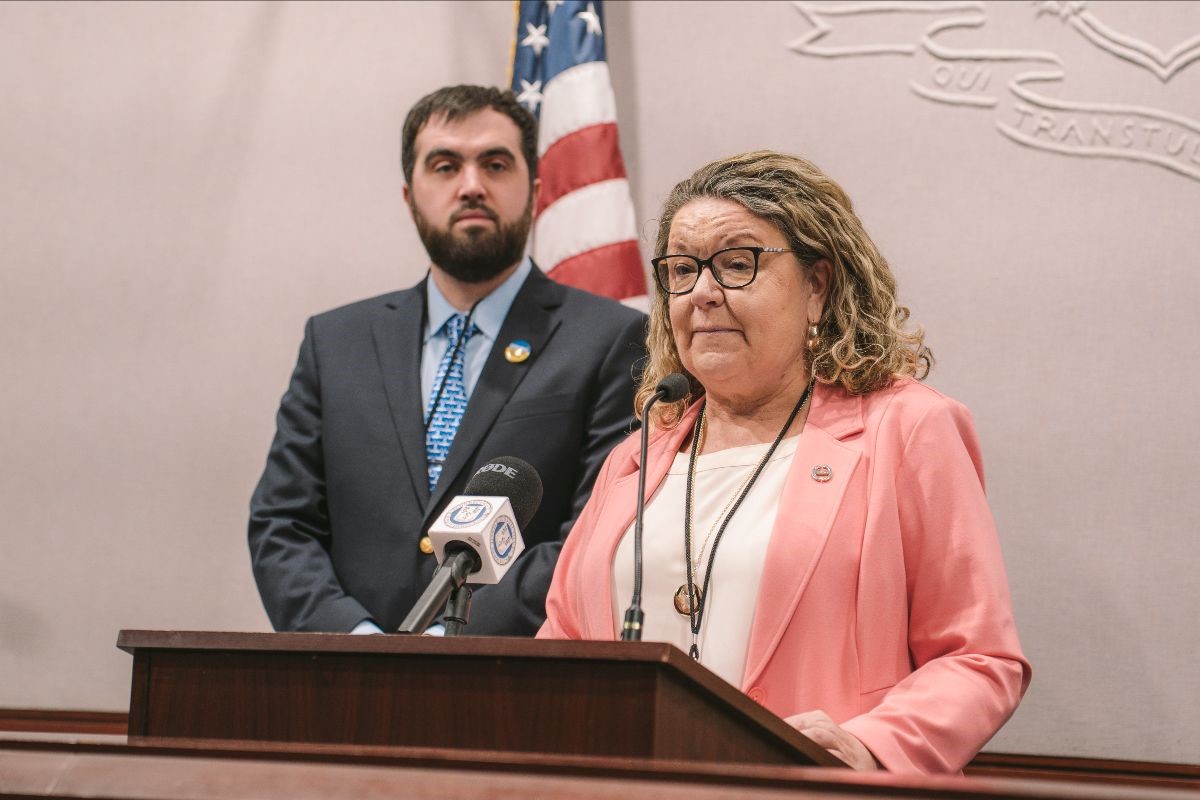
SOUTHEAST CONNECTICUT LEGISLATORS SUPPORT NEW APPROACH TO FIGHTING AQUATIC INVASIVE SPECIES

Caption: Sen. Marx speaks in Hartford Monday with Rep. Menapace looking on.
Ahead of a Monday morning public hearing in the Environment Committee considering legislation that would create a pilot program for boatwashing stations at a key Salem body of water, southeastern Connecticut legislators advocated for an evolution to the state’s approach to fighting invasive species.
State Senator Martha Marx (D-New London) and State Representative Nick Menapace (D-East Lyme, Montville, Salem) led the call ahead of the public hearing, joined by Rhea Drozdenko of the Connecticut River Conservancy.
Boatwashing stations are increasingly used in parts of the United States in the battle against aquatic invasive species, which have spread to many Connecticut bodies of water. As boaters can unknowingly carry invasive plants or plant residue on their vessels that can cause their spread in additional bodies of water, these stations provide high-pressure hot water or compressed air to clean boat hulls and prevent further spread.
This is intended to build upon existing systems in place around Connecticut educating the public about aquatic invasive species and approaching plant removal, which can be a costly, time-consuming and repetitive process.
“Gardner Lake is just the latest place in Connecticut to see invasive species invade its waters, but this problem has been pervasive for years,” said Sen. Marx. “We’re pushing for a new approach to keeping invasive aquatic species out of waterways statewide, and we believe boatwashing stations can play a significant role in keeping boats clean and preventing further spread of plants that threaten wildlife and recreation.”
“This is not just something that would be nice to have. Connecticut needs to do better in preventing the spread of invasive species like hydrilla,” said Rep. Menapace. “There’s an incredible cost to cleaning this up and the incredible economic loss we lose from invasive species is significant. When people can’t go fishing, when they can’t go boating or swimming, it’s the kind of stuff that dominates an ecosystem and kills native life there, this is a huge problem. If we don’t deal with it now and try to prevent the spread, it will just get costlier.”
“This particular strain of hydrilla originated in the Connecticut River in 2016, and since then it has spread from Agawam, Massachusetts to the edge of the Long Island Sound,” said Drozdenko. “It has taken over the main stem of the river and its tributaries, since then spreading to lakes and ponds outside the watershed. Prevention is really the key. Hydrilla is getting national attention, but we aren’t giving enough attention to prevention. It’s much more cost-effective and can preserve recreational opportunities in our waters; invasive species are a problem for both our ecosystems and for our local businesses.”
Michigan State University said these stations represent a strong prevention strategy to limit and prevent presence and spread of aquatic invasive species, which become difficult and expensive to remove if given the chance to become entrenched in a body of water.
The Department of Energy and Environmental Protection said these invasive species include hydrilla, Zebra mussels and Eurasian water milfoil, among others. They crowd out native wildlife and plant life in a body of water and can reproduce rapidly, also interfering with water recreation by clogging boat motors and polluting swimming areas.
Connecticut boating statutes already emphasize the “clean, drain, dry” technique, where boaters should inspect and clean their vessels, drain water from every part, and let them dry before going out again, for up to five days if possible. The washing station proposal would provide an on-premises way for boaters to quickly achieve that goal without damage to a boat, its components or its equipment.
Current state practices emphasize education and prevention to protect state waterways. Existing policies include a $100 violation for anyone caught transporting a vessel without inspecting and cleaning it and an Aquatic Invasive Species Stamp, funded by vessel registration or renewal and by out-of-state boaters. That stamp funds projects including increased awareness, restoration and rehabilitation of bodies of water and treatments to control aquatic invasive species.
Regions including New York state’s Adirondack region and Washington’s Olympic National Park have introduced boat washing stations to support the battle against invasive species.





